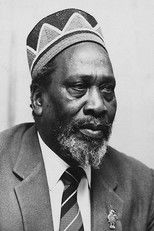
|
|
Jomo Kenyatta was born in Ngenda, Kenya in 1891. A member of the Kikuyu tribe, he was named Kamau wa Ngengi and later christened Johnstone Kamau by Scottish missionaries. He adopted the name of Jomo Kenyatta in the 1920's taking his first named from the Kikuyu word for "burning spear" and his last name from the beared belt that he often wore. Kenyatta became active in Keynan politics in the early 1920's as a member of the nationalist Kikuyu Centrant Association. By the end of the 1920's be became the nation's most infulential spokesman for freedom from colonial rule against Great Britian. Sent to England and Europe to study and garner support for his cause, he spend most of the 1930's at universities in England and the USSR. Although he remained in the UK during World War II, he kept in close contact with his followers back home. In 1946, Kenyatta returned to Kenya and was elected chairman of the Kenya African Union, the successor to the banned Kikuyu Association. Shortly after Kenyatta's return, a violent nationalist organization, the Mau Mau, was formed to oppose British rule. Aiming at various tribes that supported the British, the Mau Mau killed thousands of Kenyans between 1948 and 1952 which then erupted into full-scale civil war in 1953. Although Kenyatta always denied any connection with the Mau Mau he was the unchallenged leader of the Kenya's nationalist movement and it seems improbable that he did not have some link to the Mau Mau with a large Kikuyu organization. Kenyatta was arrested by the British on October 20, 1952 on charges that he was inciting the insurrection and was jailed for nine years. After Kenyatta was released from prison in August 1961 he continued his work for national independence which was finally granted on December 11, 1963 which made him a natonal hero. He became prime minister and then president of Kenya and dedicated the remainder of his life to helping Kenya build itself up from the long and destructive independence movement. The aged Kenyatta died in office in Nairobi on August 22, 1978. |
